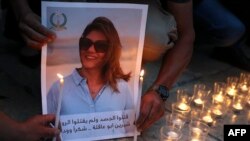The family of Shireen Abu Akleh on Thursday called on the U.S. to ensure a “thorough, independent, transparent investigation” into the killing of the Palestinian American journalist.
Abu Akleh, a veteran news correspondent for Al Jazeera Arabic, was shot dead on May 11 while covering an Israeli operation in Jenin, West Bank.
The journalist’s family, media rights groups and several U.S. lawmakers have called on the U.S. administration and Justice Department to ensure accountability over her killing.
At a media briefing at the National Press Club in Washington on Thursday, Lina Abu Akleh noted that in the four months since her aunt was killed there has been “no accountability and no action from the U.S. administration.”
“This is the U.S. administration’s role — to take on this case,” Lina Abu Akleh said, “We didn’t have the opportunity to even grieve as a family. We couldn’t mourn our dear aunt because we had to continuously call for accountability, for justice.”
National Press Club president Jen Judson noted that Abu Akleh was killed while wearing a vest marked PRESS.
“Until we can figure out why and how this happened in great detail, the safety of every journalist working in the area is at great risk,” Judson said.
Statements from U.S. lawmakers showing bipartisan support for an independent investigation were shared at the event, including from Representative Andre Carson, an Indiana Democrat.
Carson in July announced a Justice for Shireen Act to compel the State Department and FBI to produce a report on the journalist’s death in consultation with the Defense Department and Director of National Intelligence.
“This is the bare minimum of what she deserves,” Carson said in a statement about the act.
An independent investigation by the United Nations found that the fatal shot was fired by Israeli Defense Forces and “found no information suggesting that there was activity by armed Palestinians” near where Abu Akleh and other journalists were located.
A forensic analysis by the U.S. Security Coordinator for Israel and the Palestinian Authority, which is part of the State Department, found “gunfire from IDF positions was likely responsible” but “no reason to believe that this was intentional.”
The Israeli Embassy did not respond to VOA’s request for comment.
But Israel has previously denied that its forces targeted the journalist and says she may have been hit during an exchange of fire with a militant, The Associated Press said.
During his trip to Israel in July, President Joe Biden said he would be willing to meet Abu Akleh’s family in Washington. The family has met with Secretary of State Antony Blinken but so far has not had a meeting with Biden.
The U.S. State Department did not respond to VOA’s request for comment.
Media safety
Lina Abu Akleh on Wednesday accepted the National Press Club President’s Award in her aunt’s honor.
Judson, the Press Club president and Defense News journalist, paid tribute to the veteran reporter in a statement and noted Abu Akleh’s experience working in conflict zones.
"She traveled with the experience gained working regularly and over many years in the West Bank. She knew where to stand and where not to stand. She knew how to behave to survive in that very dangerous environment. Her instincts were acute. She was careful. For years her life had depended on that,” Judson said in a statement.
Sherif Mansour, of the New York-based Committee to Protect Journalists, told VOA that accountability is needed to ensure justice in Abu Akleh’s case and to ensure the protection of other journalists working in the region.
The Committee to Protect Journalists has documented 19 cases of journalists killed since 1992 in relation to their work in Israel and the Palestinian territories. In nearly all cases, the suspected source of gunfire is Israeli military officials, the CPJ data showed.
In those cases there has been no accountability or credible investigations, Mansour told VOA. “This is what we want to avoid this time,” he said.
The CPJ is pushing for justice and accountability but also for Israel to review how it interacts with media during unrest or clashes.
“The issue is a lot more about the internationally recognized norms [and] standards that have to do with distinction of journalists being civilians worthy of protection, including in active combat situations,” he said.
Through Abu Akleh’s case, the CPJ hopes independent investigations can shed light on similar incidents.





